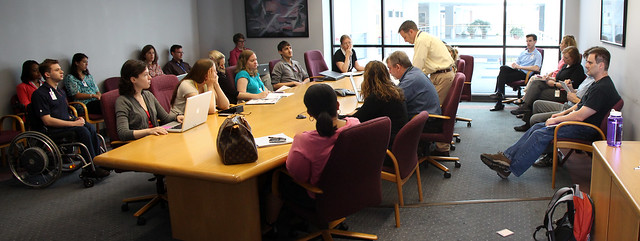A facilitator is one who contributes structure and process to interactions so groups are able to function effectively and make high-quality decisions.* (Bens, 2012)

I recently attended a full day session on building facilitation skills for meetings. Despite the large amount of time I spend in meetings—as a participant and as a facilitator-participant—I have never formally learned about meeting design. The facilitator, Charles Holmes ran a great session and I learned a lot. In this blog post, I write about one key idea from the session: Desired meeting results (the ‘learning outcomes’ equivalent of meetings).
Desired Meeting Results
Desired meeting results (DMRs) are concise written statements sent to meeting participants ahead of time, which help participants picture what they must accomplish by the end of the meeting.
Characteristics of DMRs
- Are specific and measurable
- Are nouns (not verbs) [the verbs appear in the agenda]
- Answer the stem “By the end of the meeting, we will have…” (a decision, a list, an agreement, an awareness, a plan, etcetera)
Why use DMRs?
DMRs help participants gain clarity on the following:
- What do we want to accomplish in this meeting?
- How will we know this meeting has been a success?
- What do we want to leave this meeting with?
How DRMs differ from meeting purpose and agenda
DMRs are different from the purpose, which describes the overall “why?” of having the meeting. And, they are different from the agenda, which describes the how of getting to the DMRs (the agenda is where you find the verbs).
Below is the framework that was suggested at the workshop. As mentioned above, this information would be sent to participants ahead of time:
- Why we are having this meeting (this is the purpose)
- DMRs
- How we will achieve the DMRs (this is the agenda; it links every item to a DMR)
Here is my stab at applying the framework to a meeting I am having on Tuesday.
Revisiting the DMRs at the close of the meeting
At the end of the meeting, it is important to revisit the DMRs. And, though this isn’t uniquely related to the DMRs, it is also useful to spend some time debriefing “What worked?” and “What would you do differently next time?”
For additional resources on meeting design, see:
Into the Heart of Meetings: Basic Principles of Meeting Design (Book, 2013)
Let’s Stop Meeting Like This: Tools to Save Time and Get More Done (Book, 2014)
And, of course, work by Ingrid Bens (quoted at top of page)
*Bens, I. (2012). Facilitating with ease: Core skills for facilitators, team leaders and members, managers, consultants, and trainers. San Francisco, CA: John Wiley & Sons.


